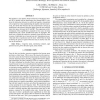Free Online Productivity Tools
i2Speak
i2Symbol
i2OCR
iTex2Img
iWeb2Print
iWeb2Shot
i2Type
iPdf2Split
iPdf2Merge
i2Bopomofo
i2Arabic
i2Style
i2Image
i2PDF
iLatex2Rtf
Sci2ools
ICASSP
2009
IEEE
2009
IEEE
What happens when cognitive terminals compete for a relaying node?
We introduce a new channel, which consists of an interference channel (IC) in parallel with an interference relay channel (IRC), to analyze the interaction between two selfish and cognitive transmitters who compete for a relay implementing the amplify-and-forward protocol. It is shown that whatever the relay location there is always an equilibrium in the resource allocation game where the users selfishly share their power between the IC and IRC. The uniqueness and determination of this equilibrium is analyzed for two cases: the relay amplification gain is fixed; the IRC direct links are negligible. We show how to exploit this analysis to optimally locate the relay either in terms of individual rate or system sum-rate. Simulations are provided and show, in particular, how the users' selfish behavior leads to sharing the space in regions where the relay is used by only one user or not used at all.
| Added | 17 Aug 2010 |
| Updated | 17 Aug 2010 |
| Type | Conference |
| Year | 2009 |
| Where | ICASSP |
| Authors | Elena Veronica Belmega, Brice Djeumou, Samson Lasaulce |
Comments (0)

